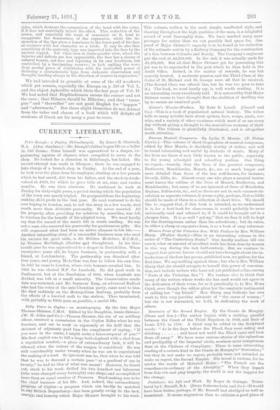CURRENT LITERATURE.
Peter Brough a Paisley Philanthrepist. By James R, Sherrock, M.A. (Alex. Gardner.)—Mr. Brough's father began life as a tailor in Old Scone ; Peter himself was apprenticed to a draper, ex- periencing agonies of shyness when compelled to serve in the shop. He looked for a situation in Edinburgh, but failed. His second attempt was made in Glasgow ; there he was engaged to take charge of a branch shop in Paisley. At the end of a year, he took over the place from his employer, starting on a few pounds which he had saved, 420 from his father, and the stock-in-trade, valued at 4450, for which he gave bills at six, nine, and twelve months. Ho was thon nineteen. Ho continued to work at Paisley for sixty-eight years, a period during which the population of the town was nearly tripled. He prospered from the beginning, making 4174 profit in the first year. He next ventured to do his own buying in London, and, to tell the story in a few words, died worth more than 4150,000 personalty. He never married. All his property, after providing for relatives by annuities, was left to trustees for the benefit of his adopted town. We need hardly say that the record of the man's life is worth reading. He was not a man who reserved his generosity for posthumous gifts. His will expressed what had been an active element in his life.— Another interesting story of a successful business man who used his success for good ends, is Sir William McArthur, K.O.M.G., by Thomas MeCallagh (Hodder atnd Stoughton). In his thir- teenth year be was apprenticed to a draper in Enniskillen. When twenty-two years old, he began business, in partnership with a friend, at Londonderry. The partnership was dissolved after four years, and young McArthur was free to follow his own line. In 1857 ho came to London, where civic honours awaited him. In 1809 he was elected M.P. for Lambeth. Ho did good work in Parliament, but at the dissolution of 1885, when Lambeth was divided, was loft in a small minority. The Conservative candi- date was returned, and Mr. Seymour Keay, an advanced Radical who had the votes of the anti-Christian party, came next to him. He died suddenly on the Metropolitan Railway, probably from the effects of a hurried walk to the station. Thus terminated, with probably as little pain as possible, a useful life.


































 Previous page
Previous page